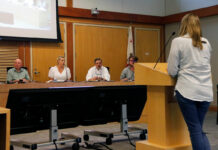In addition to Breast Cancer Awareness, October is Domestic Violence Awareness Month. Yes, there is less fan-fare or major community activity, still, Men Evolving Non-Violently (M.E.N.) is quietly celebrating the efforts made towards greater awareness about an issue that has been under the radar for far too long. Laws have been changed and more services are available to women and children who have been abused or are in danger, yet we still have a long way to go.
Every couple of months we learn about another act of domestic violence. Sometimes the perpetrator is even one of our public leaders who we trusted to help us heal this issue, not be part of the problem. What about the many violent or abusive acts that go unreported, or even unnoticed? To be effective, laws must be enforced and violators prosecuted, those in danger protected, and families educated about non-violent alternatives.
For over 30 years, Sonoma County’s M.E.N. has taken a stand on this issue, and worked to bring it out of the shadows. One of their main efforts is in helping men recognize and change their abusive and controlling behavior. M.E.N. defines abuse as any behavior that intimidates another. This includes but is not limited to emotional, psychological and verbal abuse such as, yelling, name-calling, put downs, malicious teasing, withdrawing, controlling another’s activity, restricting family money or other resources.
While there is no excuse for violent or abusive behavior, there are some explanations for why some men resort to using power and control. At the heart of the problem is a learned inappropriate response to anger or other feelings. For instance, feeling angry is normal, and if responded to skillfully, it can motivate good things. Mothers Against Drunk Drivers used their anger to take effective action, and dramatically changed our attitudes around the issue of drinking and driving.
There is no single answer why violence or any form of power and control is a ‘default’ response to their feelings, especially anger. One reason is that this behavior is often used as an outlet for frustration or other feelings such as fear or hurt, and it seems like a short cut to getting needs met. While this may be effective in the short term, it creates fear, distrust, low self-esteem and potential destruction of relationships. These behaviors are learned, and the good news from M.E.N. is that they can be unlearned.
M.E.N. provides at least three essential services in our community: a 24-hour hotline for crisis calls (707-528-2MEN); weekly groups facilitated by collective members trained as peer counselors (some who were once clients themselves), and a speakers bureau of Collective members available to speak on issues related to domestic violence to schools, civic groups or organizations seeking to reduce violence in our community. Confidentiality is always assured, records are not kept, and privacy is respected.
In the facilitated groups, men learn how to recognize their anger and other feelings, and learn alternatives to their abusive behavior instead of allowing their feelings to control their actions. M.E.N. teaches skills that help them get their needs met, and regain the trust of family members who have been subjected to their past destructive behaviors.
If you know someone who uses abusive behavior (physical, verbal, emotional or psychological), or if there is recurring tension and conflict in your relationships, please consider calling the M.E.N. hotline. Don’t let your actions continue to escalate or destroy your relationships and family. By practicing non-violent strategies, there is hope for healing and sustaining relationships based on equality, trust, empathy and love.
The hotline number is 528-2636. For more information visit www.sonomacountymen.org.
Karen Haas, MA is the M.E.N. Volunteer Outreach Coordinator.








